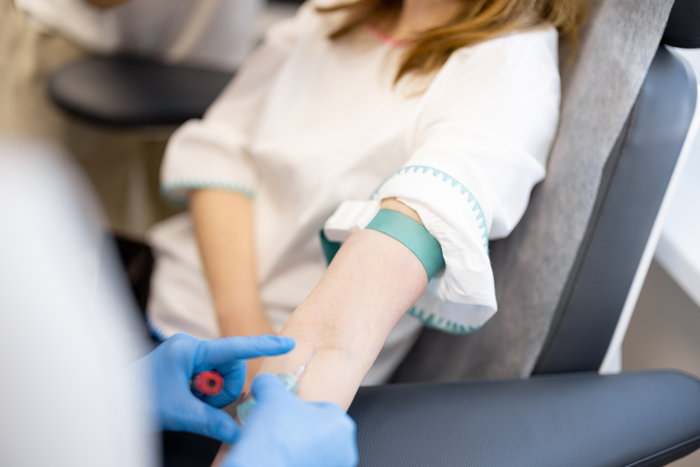
Ensure your health. Get tested today.
Convenient lab testing at your fingertips at more than 5,000 locations nationally. Consult with a doctor, or get tested on your own.

The creatinine blood test is a common diagnostic tool that healthcare providers use to assess kidney function and overall health, according to the National Institute of Diabetes and Digestive and Kidney Diseases (NIDDK). They explain that by measuring the level of creatinine, a waste product produced by muscle metabolism, in the blood, doctors can gain valuable insights into how well the kidneys are filtering waste from the body.
The creatinine blood test measures the amount of creatinine in your bloodstream. Creatinine is a waste product that forms when creatine, a molecule important for energy production in muscles, breaks down, according to the NIDDK. They explain that healthy kidneys filter creatinine out of the blood and excrete it in urine. Therefore, the level of creatinine in the blood can be an important indicator of kidney function.
Elevated levels of creatinine in the blood may suggest that the kidneys are not working efficiently, potentially due to conditions such as chronic kidney disease, acute kidney injury, or other underlying health issues, according to the NIDDK. Conversely, lower-than-normal levels of creatinine might indicate muscle problems or conditions that affect muscle mass, they note. The test is simple, according to MedlinePlus, typically involving a standard blood draw, and is often part of routine health check-ups or used to monitor known kidney conditions.
The creatinine blood test serves multiple purposes in the medical field, primarily related to the assessment and monitoring of kidney health, according to MedlinePlus. They note that this test is essential for diagnosing potential kidney issues, screening for kidney disease in high-risk individuals, and evaluating the effectiveness of treatments or the impact of medications on kidney function.
Below are some of the key reasons why a creatinine blood test might be performed, according to the NIDDK:
To make a diagnosis if you have signs or symptoms of kidney disease: Symptoms such as swelling, fatigue, difficulty urinating, or high blood pressure can indicate kidney problems. A creatinine blood test helps to confirm or rule out kidney disease.
To screen for kidney disease if you have diabetes, high blood pressure, or other conditions that increase the risk of kidney disease: People with these conditions are at higher risk for kidney disease. Regular screening with a creatinine blood test can help detect kidney issues early, allowing for timely intervention.
To monitor kidney disease treatment or progression: For individuals already diagnosed with kidney disease, the creatinine blood test is used to track the effectiveness of treatments and monitor disease progression, ensuring that the kidneys are functioning as well as possible.
To monitor for side effects of drugs that may include kidney damage or altered kidney function: Certain medications can affect kidney function. Regular creatinine blood tests can help detect any adverse effects early, allowing for adjustments in medication or dosage to prevent further kidney damage.
To monitor the function of a transplanted kidney: After a kidney transplant, it is crucial to ensure that the new kidney is functioning properly. Regular creatinine blood tests help monitor the health and performance of the transplanted kidney, allowing for prompt action if any issues arise.
Preparing for a creatinine blood test is relatively straightforward, but understanding the steps involved can help ensure accurate results and a smooth experience.
MedlinePlus notes that before the test, your healthcare provider may give you specific instructions, such as fasting for a certain period or avoiding certain medications that could affect creatinine levels. Generally, it’s advisable to stay well-hydrated by drinking plenty of water, as dehydration can influence test results, they note. They also explain that if you are on any medications, including over-the-counter drugs and supplements, inform your doctor, as some substances can interfere with the accuracy of the test. Wear comfortable clothing that allows easy access to your arm, where the blood will be drawn.
On the day of the test, you will typically visit a laboratory or your healthcare provider's office, according to MedlinePlus. They note that a healthcare professional will clean the area on your arm with an antiseptic and use a needle to draw a small sample of blood from a vein, usually in your arm. The procedure is quick, usually taking only a few minutes, and involves minimal discomfort. After the blood is drawn, you may be asked to apply pressure to the site to minimize bruising, according to MedlinePlus. The sample is then sent to a laboratory for analysis, and your healthcare provider will discuss the results with you during a follow-up appointment.
When it comes to assessing kidney function, the creatinine blood test is a commonly used tool. This test measures the level of creatinine in the blood, which is a waste product produced by the muscles and excreted by the kidneys, according to the MedlinePlus. They note that interpreting the results of a creatinine blood test can provide valuable information about the health of the kidneys and overall kidney function.
Here are some key factors to consider when interpreting the results, as noted by MedlinePlus:
This is the primary indicator of kidney function. A high level of creatinine in the blood may indicate impaired kidney function, while a low level may suggest good kidney function.
This is a calculation based on the creatinine level, age, gender, and race, which provides an estimate of how well the kidneys are filtering waste from the blood. A lower GFR may indicate decreased kidney function.
This test measures how efficiently the kidneys are clearing creatinine from the blood. A lower creatinine clearance may indicate decreased kidney function.
This test measures the amount of albumin (a protein) in the urine in relation to creatinine. A high ratio may indicate kidney damage.
By considering these factors and discussing the results with a healthcare provider, individuals can better understand their kidney function and take appropriate steps to maintain or improve their kidney health.
The creatinine blood test is used to assess kidney function by measuring the level of creatinine, a waste product, in the blood.
High creatinine levels may indicate inefficient kidney function, while low levels could suggest problems with muscle mass.
The test is used to diagnose kidney disease, monitor the effectiveness of treatments, and check the impact of medications on kidney function.
Preparation may involve fasting, avoiding certain medications, and staying well-hydrated to ensure accurate results.
A healthcare professional draws a small sample of blood, usually from your arm. The sample is then sent to a laboratory for analysis.

Convenient lab testing at your fingertips at more than 5,000 locations nationally. Consult with a doctor, or get tested on your own.